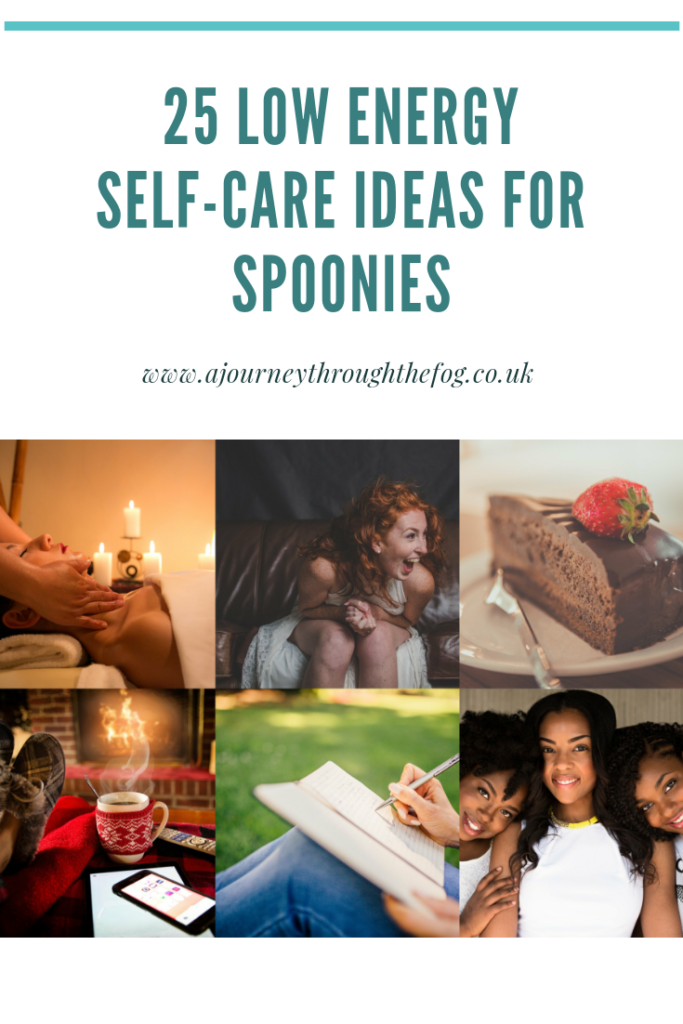
When you live with chronic ill-health self-care can look very different to what’s often recommended – going for a walk or socialising with friends may not be possible. But self-care is even more important for us. What happens when you don’t have the energy to give back to yourself? How do you practice self-care when vital daily tasks like personal hygiene and eating consumes your very limited energy?
What is self-care?
Self-care is a commonly used term. It’s often linked to mental well-being and we are encouraged to embrace it. But what exactly does it mean?
Self-care can simply be described as all the actions you take to look after your physical, mental, emotional and social needs. Self-care is a wonderful act of appreciation, love, and kindness for oneself – something to be cherished.
Unfortunately when chronic illness is thrown into the mix of day-to-day life, self-care often gets side-lined. We often feel guilty for using our precious energy on tasks that are seen as unproductive, or frivolous. But these fun acts and moments of calm are just as important, and productive as our daily hygiene routine. Taking care of our mental health is a vital part of our well-being.

What self-care looks like for me as a person living with severe ME/CFS
When your energy and mobility are limited, self-care becomes a lot less glamorous than the picture painted in magazines and lifestyle blogs. Chronic illness can turn even the most basic forms of self-care, like taking a shower and cooking a meal, into a challenge.
Living with severe ME/CFS means everyday is a battle. Even basic tasks are challenging. I’m often in what I call ‘survival mode’. All my limited energy is consumed by just getting through the day.
For years I viewed self-care as something indulgent and inaccessible to me. But neglecting self-care only added to the deterioration of my mental health. You see, for as long as I can remember, I have always put so much pressure on myself. I’m not sure why I do it, but I set such high standards even though I’m living with a debilitating illness, and I know I’m not alone in this behaviour.
So for me, self-care is often just taking the pressure off. It’s allowing myself to simply ‘be’. It’s saying, TODAY:
- I will not stress over what I can’t control
- I will speak kindly to myself
- I will forget about doctors appointments or benefit applications
- I will take a step back from social media
- I will practice self-compassion
- I will take a deep breath and try to acknowledge the progress I have made
- I will not let other people’s expectations dictate my actions
- I will not feel guilty for doing what is right for me, right now
- I will block out the ableist bullshit
- I will focus on my well-being without expectation or judgement
- I will forget about having to stay strong for others, and instead do whatever I need to do to get me through the day
How to practice self care when living with chronic illness
Before I move on to suggest a few low energy self-care activities, I just wanted to mention a couple of things. We often wrongly feel that putting ourselves first and taking the time to look after our mental health, is frivolous or selfish. This is not true – quite the opposite, it is vital for our health. We may need to rethink some of our current misperceptions about self-care in order to embrace it successfully.
It’s ok to say no: Setting boundaries is necessary when it comes to reducing your stressors and maintaining self-care. Saying no does not make you a bad person and it certainly doesn’t mean you don’t care. Saying no means that you are giving yourself the space you need to heal. Learning my boundaries and respecting them has been really important for me.
Prioritise yourself: Taking care of yourself first is essential. It will allow you to repair, restore and recharge. This, in turn, can allow you to give some of your time and energy to others. As the popular quote says: “You cannot pour from an empty cup.”
Don’t be afraid to ask for help: It’s bad enough that you already feel guilty for being chronically ill. Please try not to let fear or pride get in the way of asking for help, it’s essential for our health.
Make time for fun stuff: Do what makes you smile. We often have to prioritise dull, everyday stuff, and see fun stuff as frivolous or a waste of energy. But laughter has been shown to relieve stress and boost the immune system. Laughing makes you feel good and can reduce anxiety.
25 Low energy self-care ideas for spoonies

Even with very limited energy there are self-care activities that we can practice. Acts of self-care do not need to be extravagant or complicated. They may not be what is commonly suggested, or even seem that much, but they can make a real difference.
I find making a ‘self-care basket’ in advance is a great way to reduce the energy needed to carry out these tasks. It means that when you really need to take a moment to be kind to yourself, everything will be in one place, and you can save precious spoons searching for stuff each time.
Here are a few self-care ideas:
- Read a book, or listen to audiobook
- Have a soak in the bath without worrying about washing your hair or shaving
- Speak to a good friend
- Listen to your favourite Music
- Try a guided meditation or simply spend a few minutes taking deep, slow breaths
- Take a break from social media
- Find something that makes you laugh. Laughing is a very powerful mechanism.
- Be creative. Draw, paint or doodle. Sew, knit or crochet.
- Write a poem or jot your thoughts in a journal
- Light your favourite candle
- Look at some old photos and reminisce
- Ask a friend to help you indulge in a bit of pampering – a massage, paint your nails or apply some makeup
- Listen to your favourite Podcast
- Snuggle up with a blanket and hot water bottle
- Give yourself a hug; take the time to thank your body. Wrap your arms around yourself and give thanks for all that your body has done and continues to do.
- Treat yourself to something new
- Practice saying positive affirmations
- Buy a small luxury treat as a way of valuing yourself
- Be selfish. Do one thing each day just because it makes you happy
- Unplug for all electronics an hour
- Indulge in your favourite food
- Take a nap without guilt
- Spend time with your pet. Our animals bring us great comfort and stroking pets has been proven to reduce stress and improve mental health
- Apply a face mask
- Take time to do nothing at all
Be kind to yourself
Practicing self-care is crucial for everyone, but more so if you live with chronic ill-health. It isn’t just about crossing tasks off a checklist; it’s a mindset of treating yourself kindly. More importantly, self-care is not just about doing things to feel better right now, but also constructively working on your long-term wellbeing.
We often feel like we need to push through the pain and exhaustion to get tasks done. Self-care in this respect could simply be giving yourself a break from the pressure to accomplish tasks which make your symptoms worse.
Give yourself permission to ask for help if you need it. Through practising regular self-care you’ll get to know yourself better and as a result, you’ll be kinder to yourself. This is a good thing.
Please remember: self-care is not selfish, indulgent or vain. It is definitely not about ignoring the needs of others. Self-care doesn’t have to be time-consuming – plenty of self-care activities take just minutes It doesn’t have to be complicated – there are lots of easy, simple activities you can do. And it doesn’t have to be expensive.
Do you have any low energy self-care ideas you would like to add?
For more personal stories, reviews, news, inspirational quotes and in-depth discussion, please head over to my Facebook page.

Some great suggestions in this post Jo. I always go for a walk and listen to a podcast when I need to prioritise my self-care. I feel selfish sometimes, but I always come back a better me, and I know that it does me good. Both walking and podcasts are great distractions from my pain and thoughts.
I love podcasts too, they are a great way to unwind and escape.
Self-care really is so, so important. It goes beyond bubble baths and candles, and I like that you’ve included the stuff that can’t be seen. I also like the actionable things we can do to make ourselves feel a little better and, as you say, to “as a way of valuing yourself”. Fab post! xx
Thank you Caz
Fab list of self-care practices! Taking a step back from social media is one I put into practice in the fall. I had no clue how much I needed it until after the first month. I had time to focus on what was really important. It has been three months and I am still limiting my time spent on social media. I may never go back to spending the amount of time that I used to. The peace and focus it has brought into my life are worth not knowing what so and so ate for breakfast. LOL.
Thank you. I try to take regular breaks from social media too but I probably don’t do it enough. It’s so easy to get consumed by it, and I have a unhealthy tendency to get caught up in exhausting arguments, especially on Twitter.
Some great suggestions in here Jo, thanks for sharing!
When I don’t have the energy to concentrate to read, I find wonderful distraction from the many garden, travel, cooking, history and other educational programs which are available on tv/internet streaming services. I come away with information and also experience the distraction that beauty and education can provide. There are times to unplug, but also to plug-in!
I’m really glad you are able to distract yourself with these programs. I find TV too exhausting but I do enjoy watching short videos about travel, nature and food on social media.